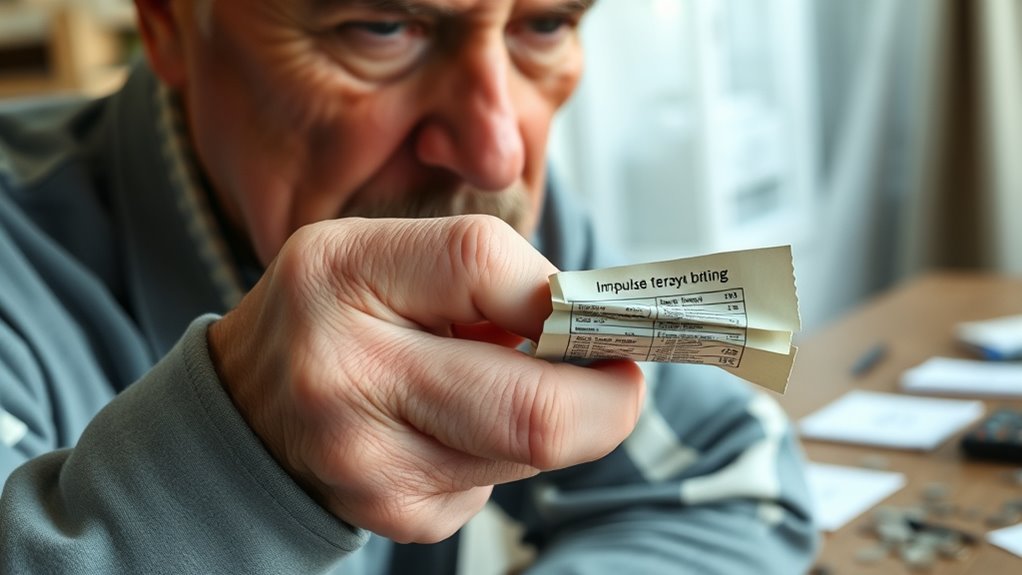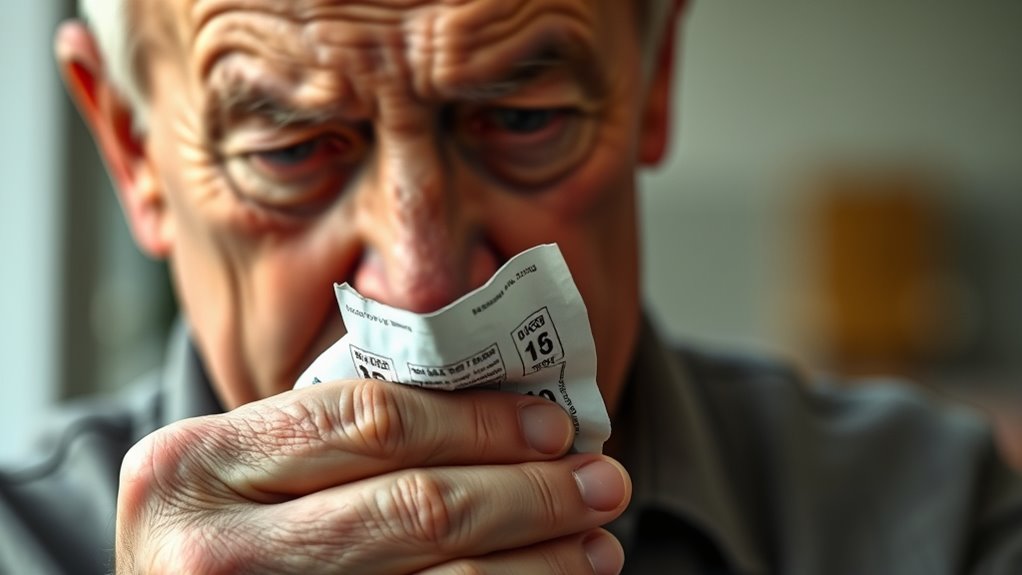Parkinson’s disease can affect dopamine pathways in your brain, which may lead to impulse-control symptoms like compulsive gambling, hypersexuality, or excessive shopping. These behaviors are often linked to both the illness and certain medications, especially dopamine agonists. Recognizing these signs early and working with your healthcare team can help manage them effectively. If you want to understand more about why these symptoms happen and how to handle them, there’s helpful information ahead.
Key Takeaways
- Parkinson’s disease affects dopamine pathways, which can impair impulse control and lead to compulsive behaviors.
- Medications like dopamine agonists may increase risks of impulsive actions such as gambling or overeating.
- Behavioral symptoms include compulsive shopping, hypersexuality, and risky decision-making, often challenging to manage.
- Recognizing warning signs early, like secretive behaviors or financial issues, is vital for effective intervention.
- Managing impulse-control symptoms involves medication adjustments, therapy, routines, and open communication with healthcare providers.
Understanding the Link Between Parkinson’s and Impulse-Control Issues

While Parkinson’s disease primarily affects movement, many patients also experience impulse-control issues that can be challenging to manage. These symptoms arise because Parkinson’s impacts dopamine levels, a neurotransmitter that governs reward and impulse regulation. When dopamine pathways are disrupted, your brain’s ability to control impulses diminishes, leading to behaviors like compulsive shopping, gambling, or overeating. Medications used to treat Parkinson’s, especially dopamine agonists, can further influence these pathways, increasing the risk of impulse-control problems. Understanding this link helps you recognize that these behaviors aren’t intentional but are connected to the disease’s neurological effects. Being aware of this connection allows you to work with your healthcare team to develop strategies that address both motor and impulse-control symptoms effectively.
Common Types of Impulse-Control Symptoms in Parkinson’s Patients

You might notice some Parkinson’s patients develop impulse-control symptoms like gambling excessively, engaging in hypersexual behavior, or shopping compulsively. These behaviors can be surprising and challenging to manage. Recognizing these common types helps you understand what to watch for and address early. Additionally, awareness of impulse-control disorders can facilitate timely intervention and support. It is also important to consider how medication side effects may contribute to these behaviors, emphasizing the need for careful management by healthcare providers. Studies suggest that certain medications used in Parkinson’s treatment may influence collagen production, potentially impacting skin health and related behaviors.
Pathological Gambling Risks
Pathological gambling is one of the most common impulse-control symptoms observed in Parkinson’s patients, often emerging as a side effect of dopaminergic medications. You might find yourself betting more than intended, chasing losses, or risking large sums without considering the consequences. This behavior can develop quickly and become difficult to control, impacting your finances and relationships. The risk is higher if you’re on medications that increase dopamine levels in brain regions responsible for reward and motivation. It’s important to recognize early signs and communicate openly with your healthcare provider. Adjustments to your medication or additional support can help manage these urges. Being aware of gambling risks allows you to take proactive steps and protect your well-being.
Hypersexual Behavior Signs
Hypersexual behavior is one of the common impulse-control symptoms seen in Parkinson’s patients, often linked to dopaminergic treatments. You might notice an increased interest in sexual activities, frequent fantasies, or engaging in risky sexual behaviors without considering consequences. This behavior can feel overwhelming or involuntary, leading to confusion or distress. Some individuals may seek out multiple partners or spend excessive time on sexual pursuits. It’s important to recognize these signs early, as they can impact personal relationships and emotional well-being. While this behavior stems from medication effects, it’s essential to discuss these symptoms with your healthcare provider. Adjusting your treatment plan can help manage hypersexual urges and improve your quality of life.
Compulsive Shopping Tendencies
Compulsive shopping tendencies are a common impulse-control symptom experienced by many individuals with Parkinson’s disease, often linked to dopaminergic medications. You might find yourself spending impulsively, unable to resist the urge to buy items you don’t need. This behavior can lead to financial stress and strain relationships. Recognizing these tendencies is essential for managing your health and well-being.
- Sudden, intense urges to purchase
- Spending beyond your means
- Secretive shopping behaviors
- Emotional relief through shopping
- Regret or guilt afterward
Understanding these signs helps you and your healthcare team develop strategies to control impulsive spending, ensuring your quality of life remains unaffected by these symptoms.
How Parkinson’s Medications May Influence Impulsive Behaviors

Parkinson’s medications, especially dopamine agonists, can increase impulsive behaviors by affecting your brain’s reward system. These drugs may boost your risk-taking tendencies and alter your impulse control. Understanding how they influence dopamine levels helps you manage potential behavioral changes. Incorporating digital literacy strategies can also support patients in recognizing and managing impulsive actions effectively. Being aware of how medication impacts your brain chemistry enables more informed decisions about managing side effects. Additionally, understanding the role of water parks and other recreational activities can provide healthier outlets for impulse control and stress relief. Staying informed about tableware trends and safety can also promote healthier social interactions and environments, which may positively influence behavioral responses. Ongoing research into AI safety measures emphasizes the importance of monitoring behavioral responses to new therapies.
Medication Effects on Impulsivity
Medications used to treat Parkinson’s disease can considerably influence impulsive behaviors, with some drugs increasing the likelihood of such symptoms. You might notice that certain medications, especially dopamine agonists, can heighten impulsivity or lead to compulsive activities. These effects vary depending on the drug and individual response. It’s *essential* to monitor how your behavior changes with medication adjustments.
Here’s what you should know:
- Dopamine agonists are linked to increased impulsivity.
- Medication dosage can impact impulsive tendencies.
- Rapid changes in medication may trigger symptoms.
- Some patients develop compulsive gambling or shopping.
- Impulsivity may diminish as medication doses are adjusted.
Being aware helps you and your healthcare team manage these risks effectively.
Dopamine and Risk-Taking
Dopamine plays a key role in regulating risk-taking behavior, which can be especially influenced by medications used to treat Parkinson’s disease. When you take dopaminergic treatments, they increase dopamine levels in your brain, especially in areas linked to reward and decision-making. This boost can make you more prone to impulsive choices or risky activities, as your brain’s natural balance shifts. Some medications, particularly dopamine agonists, are more likely to heighten these tendencies. You might find yourself more willing to gamble, engage in excessive spending, or pursue risky behaviors without fully considering the consequences. Understanding this connection helps you recognize how your medication can influence your impulses, making it important to monitor your behaviors and discuss any concerns with your healthcare provider.
Recognizing the Signs and When to Seek Help

Because impulse-control symptoms can develop subtly, it’s important to stay alert to changes in your behavior. You might notice sudden urges to gamble, binge eat, or shop excessively, even if they seem out of character. Pay attention to increased risk-taking or impulsivity that interferes with daily life. Recognizing these signs early can help you seek support before they worsen. Watch for:
- Unexplained financial losses or debt
- Sudden compulsive behaviors
- Feeling unable to control urges
- Strained relationships due to impulsivity
- Increased secrecy about activities
If you notice these signs, don’t wait—talk to your healthcare provider. Early intervention can help manage symptoms effectively and improve your quality of life. Trust your instincts and seek help when needed. Recognizing behavioral changes is crucial for timely support.
Strategies for Managing Impulse-Control Challenges

Managing impulse-control challenges involves a proactive approach that combines lifestyle adjustments, self-awareness, and support systems. You can create routines to reduce temptation and stay grounded. Recognizing triggers helps you avoid risky situations. Building a support network—family, friends, or support groups—gives you encouragement and accountability.
Visualize your strategies with this table:
| Daily Routine | Trigger Management | Support System |
|---|---|---|
| Set regular sleep and meal times | Identify stress or boredom as triggers | Talk openly with loved ones |
| Practice mindfulness or meditation | Avoid impulsive environments | Join a support group |
| Limit alcohol and impulsive spending | Use distraction techniques | Seek professional counseling |
| Keep a journal of urges | Develop healthy outlets | Share progress with trusted individuals |
| Stay physically active | Recognize early warning signs | Maintain ongoing communication |
Collaborating With Healthcare Providers for Optimal Care

Collaborating effectively with your healthcare team is essential for optimizing your care and addressing impulse-control symptoms. Open communication helps guarantee your treatment plan is tailored to your needs, reducing risks and improving quality of life. You should feel comfortable sharing your concerns, symptoms, and any side effects you experience. Regular check-ins with your neurologist or specialist can lead to adjustments in medication or therapy strategies. Keep a symptom diary to track patterns and discuss these insights during appointments. Building a strong partnership with your providers empowers you to make informed decisions and stay proactive. Additionally, staying informed about advancements in AI automation can help you better understand how emerging technologies might influence future treatment options. Understanding medication management is crucial for managing side effects and ensuring your treatment remains effective. For instance, understanding the horsepower of electric bikes can provide insights into how powerful tools or devices might be used safely and effectively in daily routines. Being aware of the cultural significance of community celebrations can help you connect with support networks and improve emotional well-being. Recognizing the importance of coolers and freezers in storage and safety can also be relevant when managing medications or supplies at home. Ask questions about medication side effects and alternatives. Report new or worsening symptoms promptly. Discuss non-pharmacological approaches, such as therapy or lifestyle changes. Understand the potential impact of impulse-control symptoms on daily life. Stay informed about latest research and treatment options.
Frequently Asked Questions
Are Impulse-Control Symptoms Reversible in Parkinson’S Patients?
Impulsivity symptoms can sometimes improve or lessen if you adjust your treatment plan. If you notice these behaviors, talk to your doctor immediately. They might change your medication or suggest therapies to help manage impulses. While some symptoms are reversible with proper intervention, others may persist. Staying proactive and open with your healthcare team is key to controlling impulse-control issues effectively.
Do All Parkinson’S Medications Carry a Risk of Impulse-Control Issues?
About 15% of people on Parkinson’s medications experience impulse-control issues, so it’s a common concern. Not all medications carry this risk, but some, like dopamine agonists, are more likely to cause these symptoms. You should talk to your doctor if you notice any changes in behavior, as adjusting your medication can often help manage or reduce impulse-control problems. Staying informed helps you make the best choices for your health.
Can Impulse-Control Problems Occur Before Parkinson’S Diagnosis?
Impulse-control problems can occur before a Parkinson’s diagnosis, though they’re more commonly linked to medication use. You might notice issues like compulsive spending or gambling beforehand, especially if you’re taking medications that affect dopamine levels. It’s important to be aware of these symptoms early. If you experience such behaviors, consult your healthcare provider promptly, as early intervention can help manage symptoms and improve your quality of life.
How Do Lifestyle Changes Impact Impulse-Control Symptoms?
Imagine you start exercising regularly and managing stress better; these lifestyle changes can reduce impulse-control symptoms. You might find that healthy routines improve your emotional regulation and decision-making. For example, a person who cuts back on alcohol and engages in mindfulness reports fewer urges and better control. Overall, adopting positive habits can help you manage symptoms more effectively and improve your quality of life.
Are There Specific Support Groups for Managing Impulse-Control Challenges?
You can find support groups specifically for managing impulse-control challenges, which offer a safe space to share experiences and learn coping strategies. These groups are often led by mental health professionals or peer facilitators. Joining one helps you connect with others facing similar issues, gain practical advice, and feel less isolated. Check local clinics, online platforms, or Parkinson’s organizations to locate a support group tailored to your needs.
Conclusion
Understanding the link between Parkinson’s and impulse-control symptoms helps you stay alert to changes. Did you know that up to 17% of Parkinson’s patients on certain medications experience impulsive behaviors? By recognizing signs early and working closely with your healthcare team, you can manage these challenges effectively. Staying informed empowers you to maintain quality of life and keep impulsive urges in check, ensuring you continue to live confidently and safely.









